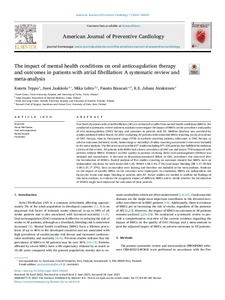The impact of mental health conditions on oral anticoagulation therapy and outcomes in patients with atrial fibrillation: A systematic review and meta-analysis
Teppo Konsta; Jaakkola Jussi; Lehto Mika; Biancari Fausto; Airaksinen K.E. Juhani
The impact of mental health conditions on oral anticoagulation therapy and outcomes in patients with atrial fibrillation: A systematic review and meta-analysis
Teppo Konsta
Jaakkola Jussi
Lehto Mika
Biancari Fausto
Airaksinen K.E. Juhani
Elsevier
Julkaisun pysyvä osoite on:
https://urn.fi/URN:NBN:fi-fe2022021519223
https://urn.fi/URN:NBN:fi-fe2022021519223
Tiivistelmä
One third of patients with atrial fibrillation (AF) are estimated to suffer from mental health conditions (MHCs). We conducted a systematic review and meta-analysis to investigate the impact of MHCs on the prevalence and quality of oral anticoagulation (OAC) therapy and outcomes in patients with AF. Medline database was searched for studies published before March 1st 2021 evaluating AF patients with comorbid MHCs reporting on the prevalence of OAC therapy, time in therapeutic range (TTR) in warfarin-receiving patients, adherence to OAC therapy or adverse outcomes (ischemic stroke, hemorrhage or mortality). Studies reporting on outcome events were included in the meta-analysis. The literature search yielded 17 studies including 977,535 patients that fulfilled the inclusion criteria of this review. AF patients with MHCs had a lower prevalence of OAC use and poorer TTR compared with patients without MHCs. Evidence on OAC quality in patients receiving direct oral anticoagulants (DOACs) was minimal and inconclusive. A decrease in depression-associated deficit in OAC prevalence was observed after the introduction of DOACs. Pooled analysis of five studies reporting on outcomes showed that MHCs were an independent risk factor for both stroke (RR 1.25, 95%CI 1.08-1.45, I2 0%) and major bleeding (RR 1.17, 95%CI 1.08-1.27, I2 27%). Data on mortality were lacking and therefore not included in the meta-analysis. Evidence on the impact of specific MHCs on the outcomes were inadequate. In conclusion, MHCs are independent risk factors for stroke and major bleeding in patients with AF. Future studies are needed to confirm the findings of this meta-analysis, to evaluate the prognostic impact of different MHCs and to clarify whether the introduction of DOACs might have improved the outcomes of these patients.
Kokoelmat
- Rinnakkaistallenteet [27094]
